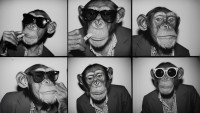Why advertising must rediscover radical humanity
AI is transforming communication, but true impact can only come from people. Empathy, creativity, and relevance are the foundation of advertising that truly matters today.
Kim Notz
30. January 2023
Why brands must rediscover humanity
These days, it’s hard to avoid one particular debate: the impact artificial intelligence will have on our lives and our jobs. Since OpenAI released its ChatGPT chatbot, we’ve seen countless trial texts—some more successful than others—produced by the program. Of course, AI will also transform our industry. And with it, communication itself. There are certainly sensible applications for very practical (and often tedious) tasks such as research, spell-checking, or translations. Perhaps even for standard product descriptions. But I doubt artificial intelligence will ever replace real communication between people. Quite the opposite: as these systems evolve, what we need most is a radical return to human qualities—creativity, context, innovation, empathy, and vitality.
In recent years, however, our industry has been dominated by an obsession with data, processes, and automation. KPIs too often dictated decisions, leading to campaigns that became increasingly interchangeable and soulless. On the agency side, consultants were reduced to efficiency managers, whereas they were once valued partners on equal footing, recognized for their marketing expertise and seniority. This relentless pursuit of efficiency has long since hit its limits. A fact underscored by the OWM itself, which openly criticized poor advertising last year. Common sense must once again matter more than the constant fixation on squeezing out yet another drop of efficiency.
The Limits of the Efficiency Race
I am convinced that a new era of humanity is about to begin. And that includes the role of advertisers. Today, people expect companies to take responsibility—not just for individuals, but for society as a whole. The task is to create meaning and contribute to the common good. I can hardly imagine ChatGPT providing a real answer to that. Such answers can only be shaped by people, and they must be reflected in the way we communicate.
Think back to the first lockdown in spring 2020. After a brief period of disorientation, many companies found a new tone—one rooted in humanity and an appeal to solidarity. At the time, many believed it was the beginning of a lasting shift in how brands spoke to consumers. But by now, most advertisers have reverted to their pre-COVID routines—and in some cases have doubled down on them. In an age of uncertainty, war, and rising prices, that approach will reach no one.
What we urgently need is a human, empathetic lens on advertising. Communication must once again focus on relevance and impact for consumers. To achieve that, agencies and companies need to step outside their bubble, cultivate curiosity, and engage with what truly matters to people. They should read what most people are reading, watch the shows that captivate the masses, and create brands within a context that feels real and relatable. That context arises only from meaningful stories—stories created by people, for people.
It also means leaders must recognize where they’ve gone astray, have the courage to ignore data when necessary, find new ways to show customer closeness, and foster psychological safety. Of course, communication must create value. But it can only do so if it carries the power to connect with people. That is the only path to shared success. And it requires companies, brands, and agencies that are willing to shape the world we live in—boldly, intelligently, and above all, with genuine interest in people.
Find more here:
Contact





